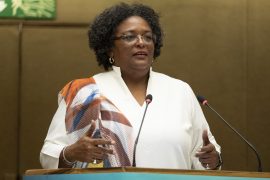- Several women ‘close to quitting SNP over gender recognition plans’
- Concerns raised over law change that advocates say will reduce obstacles to trans rights
Senior Scottish National party MPs, MSPs and councillors have expressed concerns about proposed changes to gender recognition laws as they launched a pledge calling for women to have the right to discuss such policies.
Several women at the launch for the SNP women’s pledge said they were close to quitting the party because of what they considered to be a refusal by officials to address concerns that women and girls could fall victim to predatory men or lose access to single-sex services.
Speaking on the panel, the anti-Brexit campaigner Joanna Cherry said she had faced significant abuse online for raising concerns. While she said this came from “a small minority of people”, she said the controversy raised broader questions about how the party did business.
“There are serious questions about how we develop policy in the SNP and how we conduct debate,” she said. “It’s important to disagree – we could do with more disagreement at times – but it has to be respectful.”
Cherry said she saw no conflict between signing the SNP’s official Out for Indy pledge, which supports transgender rights, and the women’s pledge.
At the private meeting, which took place on Sunday night in the city centre of Aberdeen, where the SNP conference is taking place, some attendees spoke about being labelled transphobes for raising concerns, to the extent that they felt “pushed underground”.
The SNP MSP Joan McAlpine, who also spoke on the panel, said: “These women don’t feel welcome currently, but I think it’s really important that we stay in the party and indeed look to work cross-party. We must be able to talk about this and if we could then we might find common ground.”
In June the Scottish government postponed an update of the legal rights of trans men and women, which planned a simpler, quicker process to allow people to get a new gender recognition certificate through self-declaration rather than requiring medical evidence. Additional consultation is under way.
Advocates for a law change say making the process of acquiring a gender recognition certificate less intrusive and bureaucratic, for example by removing the requirement for medical evidence, will benefit transgender individuals without having any impact on services available to women.
Transgender rights groups point out there is already an absolute commitment from the Scottish government to consult more widely on the changes, which has been welcomed by LGBT organisations, and that potential unintended consequences should be discussed openly.
The SNP leader and first minister, Nicola Sturgeon, has previously stated she does not see “the greater recognition of transgender rights as a threat to me as a woman or to my feminism”.
The meeting on Sunday, which also heard from Margaret Lynch, the founder of Glasgow Rape Crisis, the SNP councillor Caroline McAllister and Rhona Hotchkiss, a former governor of Cornton Vale women’s prison, was arranged privately.
Hotchkiss said the meeting, attended by about 60 invitees, had made her optimistic. “I think this will have an impact because we’re the first political party to come out saying women have the right to discuss these issues without being threatened or abused. This has stopped me from leaving the party. When you see a group of people together like this it gives me hope.”
The pledge, which has already been signed online by more than 1,800 people, also states that women “have the right to maintain their sex-based protections as set out in the Equality Act 2010”. It adds: “Women have the right to refuse consent to males in single-sex spaces or males delivering intimate services to females such as washing, dressing or counselling.”
Responding to the launch, Fiona Robertson, the SNP’s women’s and equalities convenor, said: “Members are free to set up interest groups on whatever they want. A feminist pledge is a great idea, and certainly one which official equalities representatives have been considering, seeing the success of the Out for Indy pledge in helping show the appetite for inclusion and equality in the SNP. Any pledge would have to be concise, clear, inclusive and in line with law and party policy.”
Source: The Guardian




